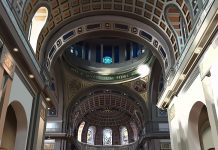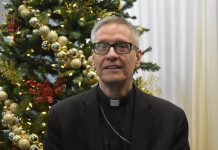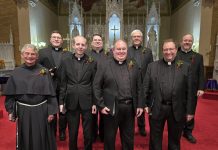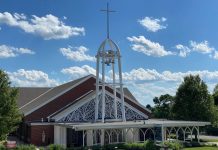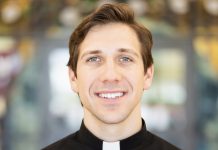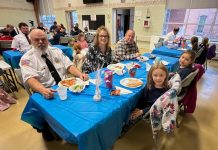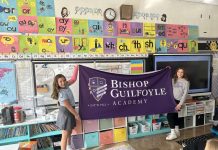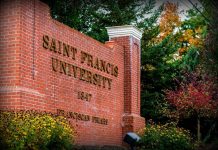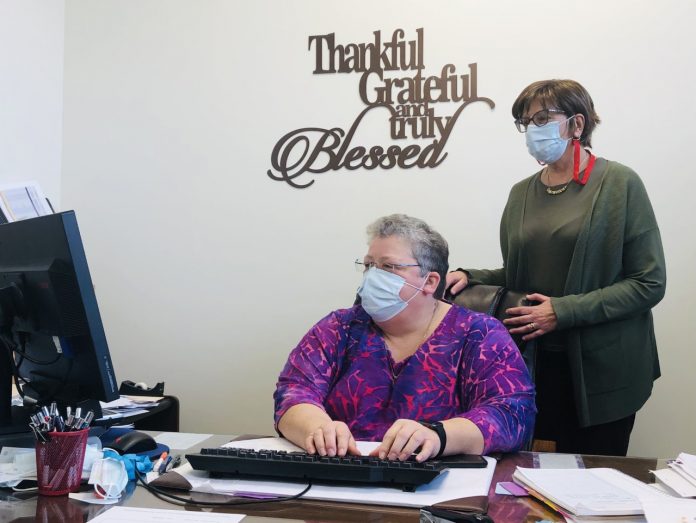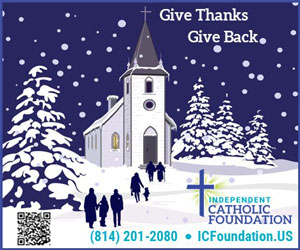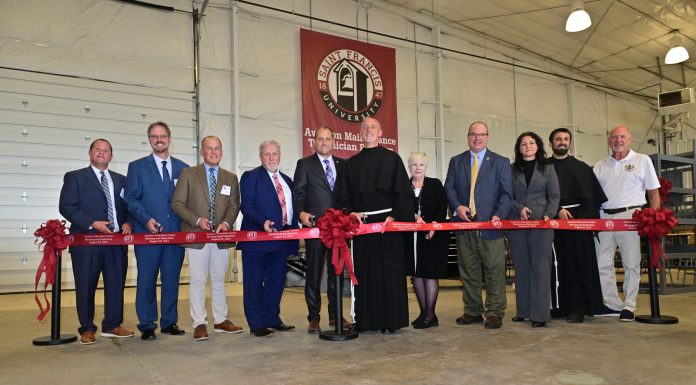By Tony DeGol
Proclaim!
Behind Jo-Ann Semko’s desk is stenciling that says “Thankful, Grateful, and truly Blessed.”
As a woman of faith and prayer, her belief in that motto is stronger than ever these days, which is no small accomplishment considering the monumental decisions she is facing.
Semko is the Director of Education for the Diocese of Altoona-Johnstown. With Executive Program Assistant Peggy Beck at her side, the two are immersed in addressing the impact of the coronavirus in Catholic schools throughout our region.
Without question, the priority is ensuring the safety of students and everyone else in the buildings.
“Everything we do is in concert with the Centers for Disease Control and the Pennsylvania Department of Health,” emphasized Semko. “They’ve been very good.”
And she should know.
Semko is in contact with the agencies several times a week depending on circumstances.
“They have been excessively helpful from day one,” she stressed. “They have never turned away a call, and they get back to us ASAP.”
Since Semko and Beck are working almost around the clock, one of the keys to their great relationship with health professionals is phone accessibility among all parties at any time of day or night and on weekends.
“Not only do they tell us what to do, they take the time to explain why we’re doing that, and that has helped us to actually cut down on our calls to DOH because with that explanation of how it works and what we’re supposed to do, we can more readily help our people without having to wait for a phone call in most cases,” Semko said.
The Diocesan Education Office has handled numerous situations involving COVID-19 since the academic year began in mid-August. Mirroring the recent jump in positive cases in local counties, Catholic schools have also seen a spike in coronavirus-related situations in recent days.
Despite the challenges, in-person education has continued in Catholic schools, with only a handful of times when remote learning has been necessary.
So what determines the response in each situation?
“Numbers play into it, including how many students have been affected,” Semko explained. “We have a lot of cases where our kids are exposed to an exposure, meaning that there is a person who tested positive for COVID-19 who is exposed to one of our kids and then that kid comes into the school. When it’s an exposure to an exposure, that may include a whole bunch of kids, but until it’s a more direct type of exposure, we don’t have to do anything at that point.”
Things are different, Semko continued, when there is actually a COVID-positive student or teacher in the classroom, or when an educator is exposed to a COVID-positive student and then moves from classroom to classroom.
“That’s when the exposure becomes greater, and once we see that larger exposure, that’s when we have to close a school or a wing or a grade level,” she added.
Semko and Beck keep a record on every case brought to the attention of the Education Office.
Data forms provide key information including if affected students ride buses or have contact with any outside individuals such as Intermediate Unit employees.
In other words, contact tracing.
Despite the concerning increase of positive COVID cases in local counties, cases in Catholic schools in Altoona-Johnstown are far below the percentage rates of the communities in which the schools are located.
“We feel very comfortable with what we’re doing right now,” Semko insisted. “We feel like we’re doing the best we can for the kids. We’re watching, literally, every day.”
Semko is especially grateful for the collaboration and support among school administrators, teachers, and staff.
“It has been an amazing amount of team work and dedication,” she stated. “They are just astounding.”
That cooperation is especially remarkable, Beck added, considering that various professional development programs are continuing as usual, as well as the normal day-to-day learning activities.
“Our teachers have been remarkable,” Beck assured.
While no one can predict what the coming weeks and months will bring, Semko and Beck are committed to continuing with in-person education as long as it can be done safely.
“And we’re going to ask them to continue wearing their masks at school, to practice social distancing, and to stay in their own environment as much as possible,” Beck said.
“Our families are the key to our success,” Semko reminded. “If they’re doing what they’re being asked to do, we’ll be successful.”
And continued prayers cannot hurt.
“These are our children as much as the parents’ children and we care about every one of them in every school and we sure hold a great responsibility here as far as making sure everybody stays safe,” Beck reflected.
“If nothing else, we’re learning to rely on God more and more every day,” Semko added.
[Photo: Jo-Ann Semko (seated) and Peggy Beck work in the Diocesan Education Office. The pair handles multiple daily situations involving the coronavirus impact in Catholic schools.]


